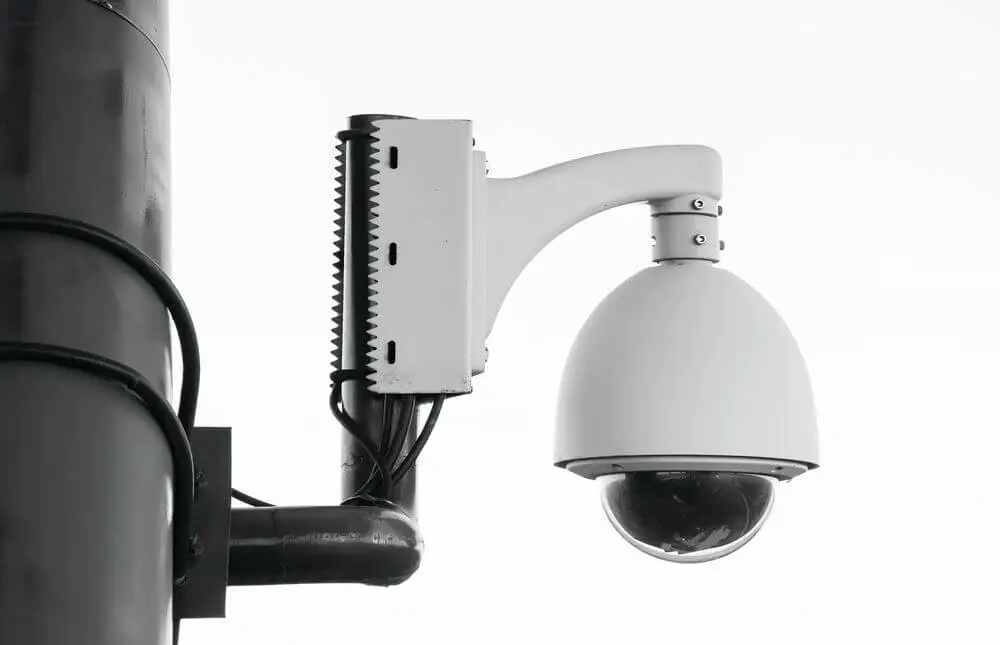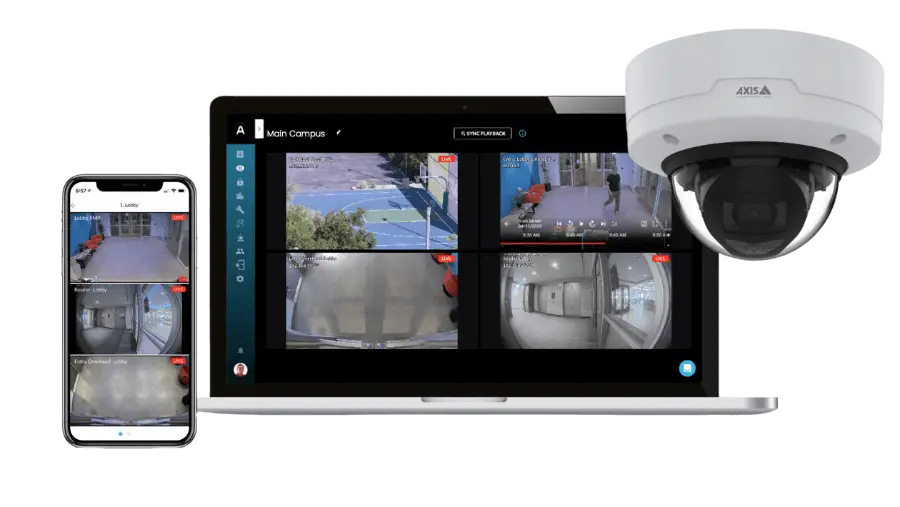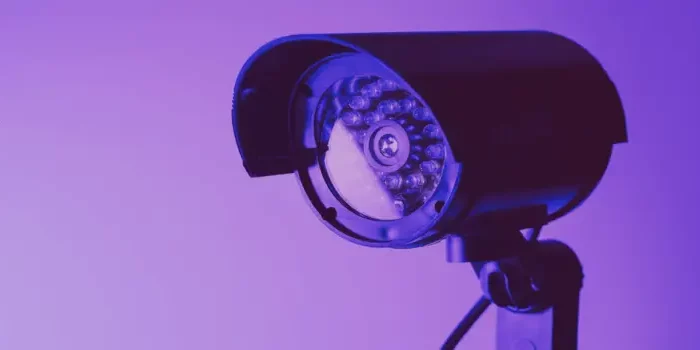Artificial Intelligence (AI) is transforming everything it touches, including the security industry and surveillance equipment. While more expensive than analog cameras, AI-enhanced security cameras offer greater peace of mind and reduce security costs over the long term by automating and streamlining security operations in ways that traditional cameras cannot.
This article discusses the unique capabilities and benefits of AI security cameras, how they work, sample use cases, and why the device-agnostic, cloud-based Arcules Video Surveillance as a Service (VSaaS) platform is the best choice for business and property owners seeking to integrate AI-enhanced cameras into their security mix.
What is an AI Security Camera and How Does it Work?
AI is revolutionizing security camera technology by enhancing surveillance capabilities, improving efficiency, and increasing the accuracy of threat detection. Modern AI-driven security cameras integrate advanced algorithms and machine learning technologies to analyze video footage in real time, make decisions, and initiate appropriate responses more quickly than any human, making them far more effective than traditional systems.
AI security cameras are digital devices that connect to the network wirelessly, greatly increasing placement flexibility and scalability. These IP cameras are typically more expensive than analog cameras but offer higher resolution plus a number of advanced imaging features. They can be programmed only to send data to a network video recorder (NVR) when motion is detected, significantly reducing video storage requirements. The data is stored and processed in the cloud, where users can take advantage of all kinds of advanced analytics. AI security cameras support data encryption and the convenience of the cloud allows for access from anywhere there is an internet connection.
Analog cameras, on the other hand, are more affordable. They use hardwired connections, which limits the number of cameras to the number of ports available on the connected digital video recorder(s) (DVR) and restricts access to on-site monitoring. Analog cameras offer lower resolution but are less prone to signal loss and interference than wireless cameras. They send a constant stream of footage to a central DVR, consuming gigabytes of data (mostly of inactivity interrupted by a few moments of interest) making searches time consuming and cumbersome. Learn more about the differences between IP and analog cameras here.
7 Benefits of AI Security Cameras

- Improved Detection and Response. AI security cameras can detect unusual behavior patterns, such as loitering or sudden movements like falls or fights, and quickly flag these activities for security personnel, thus preventing potential incidents before they escalate.
- Enhanced Accuracy. AI-powered cameras can identify and classify objects such as vehicles, bags, or weapons within their field of view. This capability is particularly useful in high-security areas like airports or public events, where timely identification of suspicious objects is crucial. Another application is the use of AI for facial recognition. This technology enables cameras to identify and verify individuals based on their facial features against pre-loaded databases, allowing for improved access control and the accurate identification of suspects in criminal investigations. Another is license plate recognition for traffic management, identifying stolen vehicles, or those with outstanding violations.
- Fewer False Alarms. In lockstep with enhanced accuracy of threat detection is the reduction in false alarms. AI can determine whether a motion is triggered by animals or weather, for example, or recognize a fight from a warm embrace, reducing the number of times a security guard is sent to physically investigate an incident.
- Enhanced Video Analytics. AI enables security systems to filter and search through hours of footage quickly and efficiently. For example, if a security officer needs to find all instances of a red car entering the parking lot in a week’s worth of video, or search for a particular or repeating behavior pattern by an individual, AI algorithms can save valuable time and resources by providing search results for actionable insights in minutes.
- Adaptable and Flexible. AI-driven cameras can adapt to various environmental conditions better than analog cameras by quickly adjusting to changes in lighting, weather, and other factors that might impair the quality of footage in traditional systems, ensuring reliable surveillance in diverse conditions. In addition, AI is being used to improve privacy protection. Advanced algorithms can not only recognize but also anonymize individuals in the footage by blurring faces, ensuring that privacy regulations are adhered to without compromising security.
- Scalable. AI security cameras are excellent for multi-site operations and large facilities. As wireless devices they can be installed anywhere there is power; no need to run cables back to a central DVR. Businesses can install or move an infinite number of AI cameras as needed, as they connect to the NVR over the network thereby removing the limitations of hardwired systems. Further, the more advanced VSaaS platforms provide centralized monitoring and control over all cameras from a single web interface.
- Cost efficiency. The net of it all is that AI security cameras reduce the need for human monitoring and therefore the number of people needed to safeguard an environment. AI cameras automate threat detection and enable rapid response, put eyes on all assets through a centralized command center, reduce false alarms, and significantly lower on-site data storage costs versus cloud-based solutions. AI cameras never sleep, show no bias, and don’t earn overtime.
AI Security Camera Use Cases
Overall, AI integration in security camera technology represents a significant leap forward, offering enhanced accuracy, proactive threat detection, and efficient data processing, thus transforming how surveillance systems operate and ensuring greater safety and security in various environments.
In hospitals, it is used to enhance patient and staff safety, augmenting on-premises security services in the event of family fights in waiting rooms or unruly patients in the ER.
In K-12 and higher education campuses, it can provide crucial minutes of advance warning and fast response to potential school shooting situations, protecting students and staff.
In large office buildings and corporate campuses, it can monitor all entrances and integrate with facility access control systems for secure employee entrance and egress.
In retail and warehouse environments, it can monitor shopper behaviors over large spaces for loss prevention or vandalism and alert staff to coordinated threats.
The list goes on…need to look for cheaters in a casino, monitor the factory floor for accidents, or observe robotic assembly lines in real time for maintenance issues? AI security cameras can be trained to identify any anomaly. What you need to complete the picture is a VSaaS platform that can leverage the power of AI. You need Arcules.
Arcules VSaaS - A Platform Built for AI

Arcules cloud-based VSaaS video surveillance subscription model reduces risk, is infinitely scalable, and is extremely affordable. Taking the next step by adding AI-enhanced security cameras to your security stack is a smart investment. The incremental cost of smart IP cameras are more than offset by the reduction in manpower and data storage requirements. Read more about the differences between cloud-based versus on-premises here.
With Arcules, you don’t have to start over. Arcules easily integrates new AI security cameras into your organization’s existing security infrastructure and access controls. In fact, Arcules supports over 6,000 types of cameras, alarms, and access control systems, eliminating switching costs and ensuring a smooth transition from legacy technology. Further, our partnership with Canon, manufacturer of the world’s leading optical solutions and camera lenses, ensures the highest video surveillance quality possible.
And because Arcules cloud-based, you are freed of the burden of storing mountains of video data and you have access to that footage anywhere, anytime. The Arcules platform offers a centralized user interface to control massive security systems from a single pane of glass. It provides access to a wide range of tools powered by AI for real-time video analytics, faster threat detection and response, and detailed reporting for a cutting-edge security environment. Together, Arcules and AI security cameras are worth every penny.
If you’d like to see the affordable, device-agnostic Arcules cloud-based video surveillance system in action and learn you can bring your security stack into the Age of AI, click here to schedule a consultation with Arcules today.
